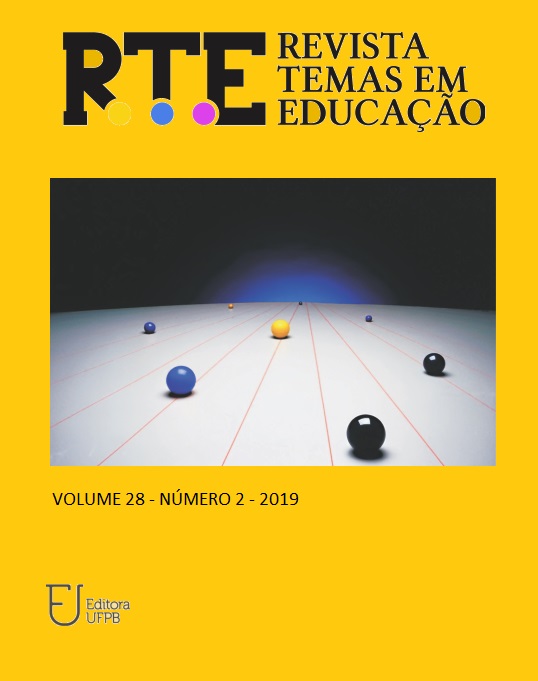EFFICIENCY OF SEXUAL AFFECTIVE EDUCATION PROGRAMS PROMOTED BY INSTITUTIONS OF SOCIAL MANAGEMENT. POTOSÍ (BOLIVIA)
EFFICIENCY OF SEXUAL AFFECTIVE EDUCATION PROGRAMS PROMOTED BY INSTITUTIONS OF SOCIAL MANAGEMENT. POTOSÍ (BOLIVIA)
DOI:
https://doi.org/10.22478/ufpb.2359-7003.2019v28n2.47663Keywords:
USMEA, SEDEGES, CIES Potosí, In-depthe interviewa, Bolivian teenagers, Social management institutionsAbstract
The functioning of the social management Institutions dependent on the Bolivian State is analyzed; objectives, methodology, real resources and results to prioritize needs and find out what are the real resources allocated by the government to the most economically influential city in the country,Potosí. Target groups, ages and characteristics are identified by the hired and / or volunteer personnel working in this type of Projects. The method used has been in-depth interviews, structured and directed in matters of education and sexual health. Theprofessionals interviewed admit that only primary medical services are available in their budget. The compulsory educational programs do not reach most of the schools in the city, let alone the rural ones. This cut promotes the ignorance of young people when it comes to acquiring strategies of control, self-help and self-care, in the short and long term, generating the difficulty of procuring a healthy lifestyle.
Downloads
References
Arévalo, C. y Suárez, R. (2012). Políticas de Salud Sexual y Reproductiva para Adolescentes y Jóvenes: Experiencias en Brasil, Chile y Colombia. Universidad Nacional de Colombia, Bogotá. [s.n]
Blaxter, L.; Hughes, C. y Tight, M. (2008). Cómo se hace una investigación. Barcelona: Gedisa. pp. 208, 209 y 211.
Cañas, A.J. y Novak, J. (2014). Concept mapping using CmapTools to enhance meaningful learning. Knowledge cartography: software tools and mapping techniques (2nd edición). New York: Springer-Verlag. pp. 23-45.
Constitución Política del Estado Plurinacional de Bolivia. (2009). Asamblea Constituyente de Bolivia. Congreso Nacional.
Corbí, M., Alonso Centeno, A. y Palmero Cámara, C. (2019). Percepciones del rezago educativo de la población indígena maya en Yucatán, según maestros de Educación Primaria. Revista de Educación de Puerto Rico, 1, 1-31.
Díaz-Bravo, L.P. (2013). La entrevista, recurso flexible y dinámico. Metodología de investigación en educación médica. Universidad Nacional Autónoma de México. México D.F.
Elliott, J. (2009). La Investigación-acción en educación. Madrid: Morata.
Fondo de Población de las Naciones Unidas. (2017). Mundos aparte. La salud y los derechos reproductivos en tiempos de desigualdad. Recuperado el 25 de enero de 2019, de: https://www.unfpa.org/es/swop-2017
Fondo de Población de las Naciones Unidas. UNFPA. (2017). Annual report. Recuperado el 1 de marzo de 2019, de: https://www.unfpa.org/sites/default/files/pub-pdf/UNFPA_PUB_2018_EN_AnnualReport.pdf
Kohler, P., Manhart, L. E. y Lafferty, W. (2008). Abstinence-Only and Comprehensive Sex Education and the Initition of Sexual Activity and Teen Pregnancy [Educación sexual solo abstinencia y amplia y la iniciación de la actividad sexual y embarazo adolescente]. Journal of Adolescent Health, 42(4), 344-351. Recuperado de http://www.jahonline.org/ article/S1054-139X(07)00426-0/abstract
Latorre, A. (2003). La Investigación-Acción, Conocer y cambiar la práctica educativa. Madrid: Morata.
Mckernan, J. (1999). Investigación-Acción y Currículum. Madrid: Morata.
Ministerio de Educación. (2018). Guía Metodológica de la Maestra/o-Facilitador/a de la Educación Primaria de Personas Jóvenes y Adultas. La Paz, Bolivia. Primera Edición. 2018.
Ministerio de Salud y Deportes. (2015). Programa Nacional de ITS-SIDA; Centro de Integración de Medios de Comunicación Alternativa. Conociendo la sexualidad en hombres y mujeres de asociaciones juveniles de El Alto y los niveles de información y actitudes respecto a la ITS, VIH y SIDA. La Paz, Bolivia. OPS. (p. 109).
Ministerio de Salud y Deportes. (2014 - 2018). Plan de Violencia Sexual. Dirección Nacional de Desarrollo de Servicios de Salud. Programa Nacional de Salud Sexual y Reproductiva. Programa Nacional de Género y Violencia. La Paz, Bolivia. (p. 8).
Ministerio de Salud y Deportes. (2010). Dirección General de Salud. Unidad de Servicios de Salud y Calidad. La Paz. Bolivia: Excelsior.
MSPS. (2004-2008). Ministerio de Salud y Previsión Social. Unidad Nacional de Atención a las Personas. Programa Nacional de Atención a la Salud Integral de los y las Adolescentes. Manual de capacitación: servicios amigables y de calidad para el adolescente. La Paz, Bolivia. (p. 156).
Plan. Promoting child rights to end child poverty. Recuperado el 28 de enero de 2019, de: http://plan-international.org/about-plan
Plan estratégico de prevención y control de la infección por el VIH y otras infecciones de transmisión sexual (2017-2020). Ministerio de Salud y Deportes. Estado Plurinacional de Bolivia. Bolivia.
Plan Nacional para la Igualdad de Oportunidades. (2014-2016). Mujeres Construyendo la Nueva Bolivia para Vivir Bien. Ministerio de Justicia. Viceministerio de Género y Asuntos Generacionales. Recuperado el 27 de marzo de 2019, de: http://www.inmujer.gob.es/areasTematicas/AreaPlanificacionEvaluacion/PEPlanes.htm
Population Concer Bolivia. (2019). Systematization and evaluation of interventions in services comprehensive health sexual and reproductive health. ONU. La Paz, Bolivia. (p. 157).
Save The Children. La voz de la Niñez Trabajadora. Recuperado el 30 de enero de 2019, de: http://www.savethechildren.es
UNESCO. (2019). Oficina Regional de Educación para América Latina y el Caribe (OREALC/UNESCO Santiago). Chile. Recuperado de http://www.unesco.org/new/es/santiago/regional-bureau-of-education/
Downloads
Additional Files
Published
How to Cite
Issue
Section
License
Authors who publish in this journal agree to the following terms:
. Authors retain the copyright and grant the journal the right to first publication, with the work simultaneously licensed under the Licença Creative Commons Attribution that allows the sharing of the work with acknowledgment of authorship and initial publication in this magazine. . Authors are authorized to assume additional contracts separately, for non-exclusive distribution of the version of the work published in this journal (eg, publishing in institutional repository or as a book chapter), with acknowledgment of authorship and initial publication in this journal.
. Authors are permitted and encouraged to publish and distribute their work online (eg in institutional repositories or on their personal page) at any point before or during the editorial process, as this can generate productive changes, as well as increase impact and citation of the published work (See O Efeito do Acesso Livre).



















